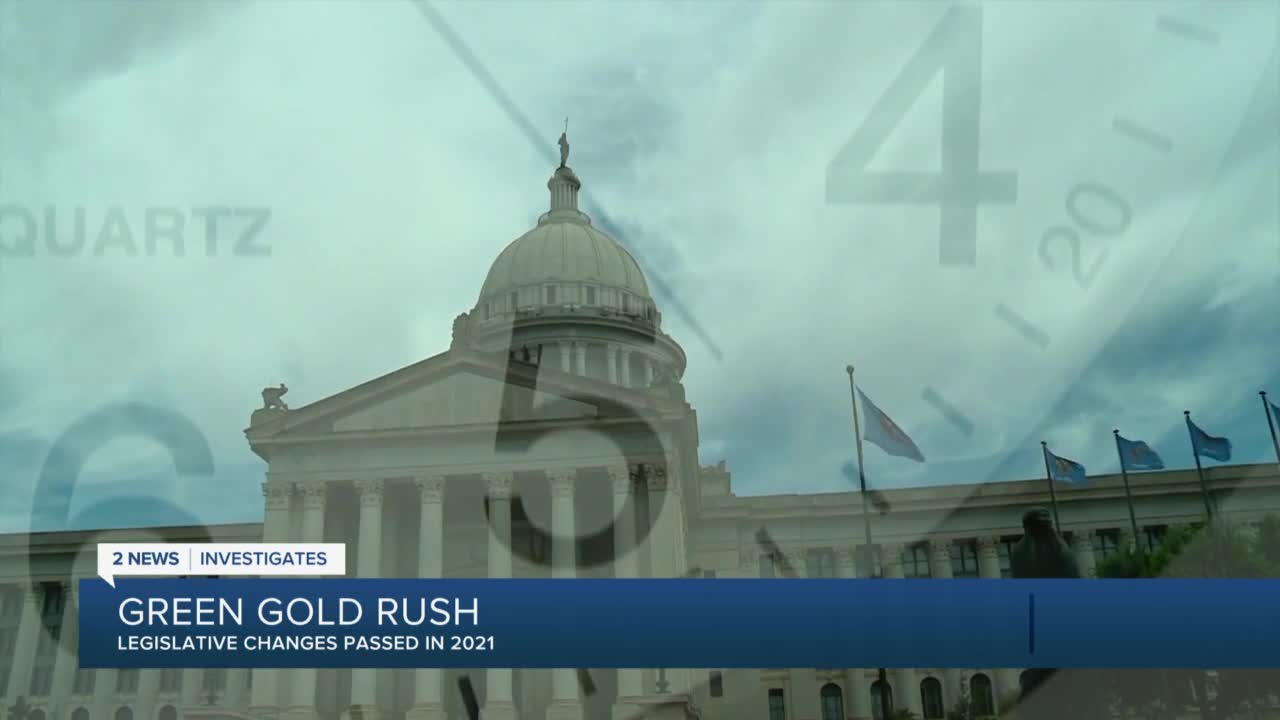TULSA, Okla. — Oklahoma state legislators are racing against the clock. Impactful medical marijuana legislation shifting hands on the final days of 2021's legislative session.
House Bill 2646, the Oklahoma Medical Marijuana Authority request bill, aims to improve the agency's enforcement of businesses. It is awaiting a signature from Gov. Kevin Stitt.
If he signs it into law, OMMA could, among other enforcement abilities, independently recall contaminated product and deny licenses to who had previously had theirs revoked or suspended.
“There are a number of pieces in there that would help us with enforcement and oversight," OMMA Director Dr. Kelly Williams said.
Williams told 2 News she is satisfied with the added help granted by the legislature...but not all legislators are content with progress made this session.
"The citizens of Oklahoma are not going to be satisfied with what we accomplish," Rep. Scott Fetgatter (R) Okmulgee, Oklahoma said.
Fetgatter told 2 News from the outset his goals this session were to strengthen OMMA's policing powers and tighten its grip on the black market.
“We haven’t gone far enough to help legal businesses, and we haven’t gone far enough to shut down illegal businesses," he said.
His all-encompassing regulatory bill, House Bill 2004, was buried in Oklahoma Senate subcommittee. His hopes of reviving it through senate legislation were dashed, too.
He said he salvaged some of its text through a "limits" bill in the state's approved fiscal budget. The law requires OMMA to hire 60 more field inspectors, equip them with necessary inspection tools, and visit grow facilities three times in 18 months.
“The presence of OMMA having boots on the ground in our counties is going to help tremendously," Fetgatter said.
“We want to make sure that all of our licensees are being inspected. That there’s not a long turnaround time for investigations," Williams said. "That we have the people in the areas that can respond immediately when there’s a problem.”
House Bill 2272 goes further and gives OMMA the ability to shut a business down if it does not report any foreign interest to the state within 60 days of application approval. It can also revoke licenses for inactive businesses.
"We had some definite wins for the citizens of Oklahoma this session, but in my opinion, because I understand the business, we haven’t gone far enough," Fetgatter said. "It's very frustrating for me at this point."
OMMA operates under the Oklahoma State Department of Health. Fetgatter told 2 News OSDH is not doing OMMA any favors.
He said, OMMA recently requested to hire 25 additional inspectors and were only allowed eleven. An OMMA spokesperson told 2 News it is working along with OSHD to beef up its staff.
"There’s still some fundamental problems that prevent them from completely doing their job," Fetgatter said.
House Bill 2674 was meant to solve his issues. The legislation would move OMMA to the Alcoholic Beverage Laws Enforcement Commission, or ABLE, and make the program a higher priority.
The bill stumbled just short of the finish line.
"The Department of Health has never made OMMA a priority in their grand scheme of things and that is a problem and will continue to be a problem," Fetgatter said.
Fetgatter said his problem with the OSDH and OMMA relationship is one that has to be solved through legislation, so it would have to be brought up again next legislative session in February 2022.
Trending Stories:
- Tulsa Race Massacre Centennial's 'Rise and Remember' commemoration canceled
- DOWNLOAD the 2 Works for You app for alerts
- Tulsa's Greenwood district thrived for decades, then highways arrived
- FOLLOW 2 Works for You on Facebook
- Search for local athlete's stolen truck, special wheelchair
Stay in touch with us anytime, anywhere --
- Download our free app for Apple, Android and Kindle devices.
- Sign up for daily newsletters emailed to you
- Like us on Facebook
- Follow us on Instagram
- Follow us on Twitter


